必修一 定语从句
高一英语必修一定语从句汇总
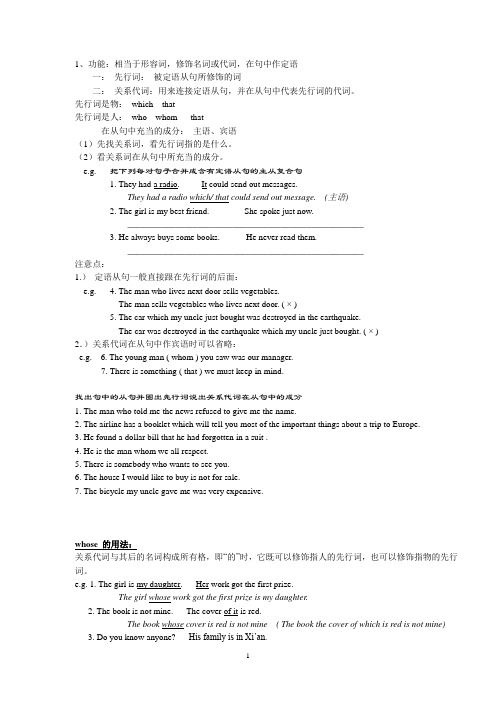
1、功能:相当于形容词,修饰名词或代词,在句中作定语一:先行词:被定语从句所修饰的词二:关系代词:用来连接定语从句,并在从句中代表先行词的代词。
先行词是物:which that先行词是人:who whom that在从句中充当的成分:主语、宾语(1)先找关系词,看先行词指的是什么。
(2)看关系词在从句中所充当的成分。
e.g. 把下列每对句子合并成含有定语从句的主从复合句1. They had a radio. It could send out messages.They had a radio which/ that could send out message. (主语)2. The girl is my best friend. She spoke just now.______________________________________________________3. He always buys some books. He never read them.______________________________________________________注意点:1.)定语从句一般直接跟在先行词的后面:e.g. 4. The man who lives next door sells vegetables.The man sells vegetables who lives next door. ( × )5. The car which my uncle just bought was destroyed in the earthquake.The car was destroyed in the earthquake which my uncle just bought. ( × )2.)关系代词在从句中作宾语时可以省略:e.g. 6. The young man ( whom ) you saw was our manager.7. There is something ( that ) we must keep in mind.找出句中的从句并圈出先行词说出关系代词在从句中的成分1. The man who told me the news refused to give me the name.2. The airline has a booklet which will tell you most of the important things about a trip to Europe.3. He found a dollar bill that he had forgotten in a suit .4. He is the man whom we all respect.5. There is somebody who wants to see you.6. The house I would like to buy is not for sale.7. The bicycle my uncle gave me was very expensive.whose 的用法:关系代词与其后的名词构成所有格,即“的”时,它既可以修饰指人的先行词,也可以修饰指物的先行词。
必修一定语从句讲义

高一英语必修一:定语从句讲义定语及定语从句一、定语句子中修饰名词或代词的成分叫做定语。
定语可以由形容词,名词,不定式,分词,动名词或从句来充当。
eg: She is a beautiful girl. (形容词)I met someone funny on my way to Beijing. (形容词)(修饰不定代词的定语后置)He is an English teacher. (名词)(名词作定语时一般用单数,例外的有sports, 如 a sports star)I have a lot of work to do. (不定式)The book written by a schoolboy is very popular now. (过去分词短语)We can see the rising sun. (现在分词) = the sun is rising.He is in the reading room. (动名词) = the room for readingThe boy who broke the window is Tom’s brother. (从句)注意:1.形容词作定语一般放在中心名词前面;但当形容词修饰的是不定代词时,要后置。
present (在场的), absent (缺席的)作定语时需要后置。
students present / absent2. 不定式做定语通常要放在被修饰的词后。
3 分词作定语时,即可放在所修饰词前,也可放在所修饰词后1)分词前置:单独的一个分词作定语,一般放在所修饰词前。
He is a retired worker.他是位退休的工人2)分词后置:在以下情况,分词放在所修饰词的后面i. 分词词组; There was a girl sitting there.有个女孩坐在那里ii. 个别分词如given, left;This is the question given.这是所给的问题iii. 修饰不定代词时There is nothing interesting.没有有趣的东西过去分词作定语与其修饰的词是被动关系,相当于一个被动语态的定语从句,表被动或已完成。
必修一限制性定语从句与非限制性定语从句

定语从句(一)一.形容词作定语与从句作定语作比较。
I don’t like lazy people.I don’t like people who is lazy.二.先行词与关系代词1.I don’t like people who never keep their work.2.I like guys who aren’t serious and who have a good sense of humor.3.He said that he had no time, which isn’t true.被定语从句修饰的对象称为先行词重复指代先行词、起连接主句和从句的作用,并且在定语从句中充当一定成分的连接词称为关系词The ruler of an kingdom warned that any man that did not tell the truth would be punished .三.关系词在从句中充当的成分1.用作主语(注:定语从句一般要紧跟在它所修饰的名词后面;定语从句中的谓语动词形式是由关系词所指代的先行词来决定的。
)The woman who lives next door is a famous dancer.(The woman is a famous dancer and she lives next door. )2.I like guys and they have a good sense of humor.3.Anger is a thief who steals away the nice moments.4.There is this difference between happiness and wisdom: the person who thinks himself the happiest man really is so, butthe person who thinks himself the wisest is generally the greatest fool.5.I’m talking about friends about who care deeply about each other, who support each other, who make life worth living.2.用作动词的宾语1.I’ d really like to find a friend and I can trust him completely. I’d rally like to find a friend who I can trust (him?) completely.2.It’s hard to have a friend and you can trust him completely.3.He is the best teacher who I have never seen.4.He is the student who teacher likes to praise for his hard work.3.作从句中介词的宾语1.I’m talking about friends and you can share almost everything with them.I’m talking about friends who you can share almost everything (with them).2.I hope I never have a boss and I can talk to him about my problems.3.I’d prefer someone who I have sth. in common with--- who I can talk ( ) easily.4.I like the people who I work ( ).(作宾语的关系词可以省去)三.关系代词与先行词的搭配关系(一).关系代词:who, whom which, that 和whose1.指“人”关系代词 who 和whom 的区别(1)who 的前面不能与介词搭配使用The engineer with (who; whom) my father works is about 50 years old.(2 ) whom 在定语从句不能做主语,但可作宾语或表语。
人教必修一Unit 4 定语从句之关系代词(解析版)
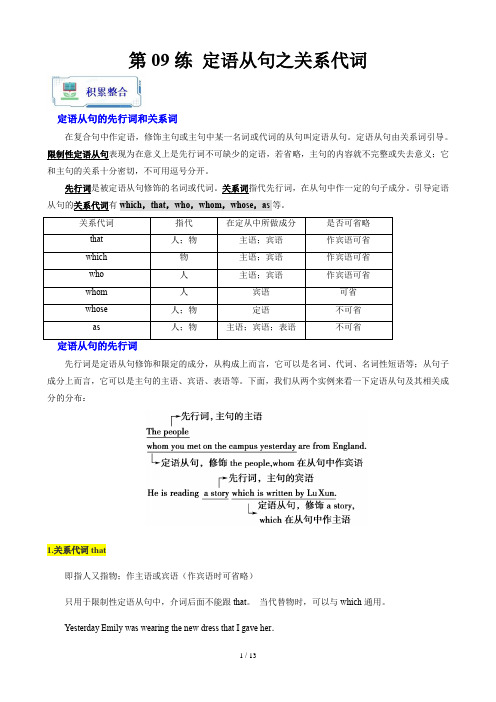
第09练定语从句之关系代词定语从句的先行词和关系词在复合句中作定语,修饰主句或主句中某一名词或代词的从句叫定语从句。
定语从句由关系词引导。
限制性定语从句表现为在意义上是先行词不可缺少的定语,若省略,主句的内容就不完整或失去意义;它和主句的关系十分密切,不可用逗号分开。
先行词是被定语从句修饰的名词或代词。
关系词指代先行词,在从句中作一定的句子成分。
引导定语从句的关系代词有which,that,who,whom,whose,as等。
先行词是定语从句修饰和限定的成分,从构成上而言,它可以是名词、代词、名词性短语等;从句子成分上而言,它可以是主句的主语、宾语、表语等。
下面,我们从两个实例来看一下定语从句及其相关成分的分布:1.关系代词that即指人又指物;作主语或宾语(作宾语时可省略)只用于限制性定语从句中,介词后面不能跟that。
当代替物时,可以与which通用。
Yesterday Emily was wearing the new dress that I gave her.昨天艾米丽穿了我送给她的新衣服。
I have a friend that likes listening to classical music我有个朋友喜欢听古典音乐。
2.关系代词which指物;作主语或宾语(作宾语时可省略)在非限定性定语从句中,只宜用which,不能用that.在限定性定语从句中,可用在介词之后。
My parents live in a house which is more than 100 years old我的父母住在一座具有100多年历史的房子里who,whom指人;作主语或宾语(whom常可省略)先行词必须为人。
Who可代替在从句中担任宾语的whom,若前有介词,须用whomA couch potato is a person who spends a lot of time watching TV.“A couch potato”指那种成天沉湎于电视中的人。
人教必修一unit 4 定语从句(Ⅰ)-关系代词的用法

头的特殊疑问句时。
last night?
他昨晚住的是哪家旅馆?
当关系词在从句中作表语时,China isn’t the country (that) it
用hat,而且常省略。如: used to be.
中国不再是以前的中国了。
当主句是以there is. here is.it There is a table in the corner that is
no, every等不定代词修饰时。
几乎没有你能做的工作。
当先行词由人、物等表示并列的词构 They talked about the men and the things that
成时。
they saw.
他们谈到了所见的人和事。
【知识点解析】
当 主 句 是 以 which 或 who 开 Which is the hotel that he stayed at
(作宾语时可省 跟that。
昨天艾米丽穿了我送给她的新衣服。
略)
当代替物时,可以与 I have a friend that likes listening to classical
which通用。
music.
我有个朋友喜欢听古典音乐。
指物;作主语或 在非限定性定语从句 My parents live in a house which is more than 100
若 前 有 介 词 , 须 用 人。
whom
The student (whom) I taught two years ago has
joined the army. 我两年前教的那个学生已经参军了。
whose
既 指 人 又 指 物 ;是代词的所有格,
高中英语人教必修一Unit1-5定语从句整理

Unit 1-5定语从句整理Unit 1:1.Do you want a friend whom you could tell everything to (=to whom you could tell everything)?2.There was a time when a deep blue sky, the song of the birds, moonlight and flowers could never have kept me spellbound.3. It was the first time in a year and a half that (=when) I had seen the night face to face.4. I am only able to look at nature through dirty curtains hanging (=which hang)before very dusty windows.Unit 2:1. At first the English spoken(=which was spoken)in England was very different from the English spoken today.2. English became less like German because those who ruled (=ruling)England spoke first Danish and later French.3. Today the number of people learning (=who learn) English in China is increasing rapidly.4. Many people believe the English spoken (=which is spoken) on TV and the radio is standard English.5. Those who reported (=reporting) the news were expected to speak excellent English.6. However, on TV and the radio you will hear differences in the way(that/ in which) people speak.7. Some people who live (=living) in the mountains of the eastern USA speak with an older kind of English dialect.8. The USA is a large country in which (=where) many different dialects are spoken.Unit 3:1. They are Dai and grew up in western Yunnan Province near the Lancang River, the Chinese part of the river that is called (=called) the Mekong River in other countries.2. We found a large atlas with good maps that showed (=showing) details of world geography.3. It makes wide bends or meanders through low valleys to the plains where (=in which) rice grows.4. Along the way children dressed (=who were dressed) in long wool coats stopped to look at us.5. We will reach Dali in Yunnan Province soon, where (=in which) our cousins will join us.Unit 4:1. It was a night (that/ when/ at which)the earth didn’t sleep.2. But the one million people of the city, who thought little of these events, were asleep as usual that night.3. It was felt in Beijing, which (=and it) is more than two hundred kilometers away.4. A huge crack that (=which) was eight kilometres long and thirty metres wide cut across houses, roads and canals.5. The number of people who were killed or seriously injured reached more than 400,000.6. Later that afternoon, another big quake which (=that)was almost as strong as the first one shook Tangshan.7. The army organized teams to dig out those who were trapped and to bury the dead.8. Workers built shelters for survivors whose homes had been destroyed.9. Your speech was heard by a group of five judges, all of whom (=and all of them) agreed that it was the best one this year.10. Next month the city will open a new park to honour those who died in the terrible disaster.11. The park will also honour those who helped the survivors.12. As you know (=As is known), this is the day(that/when/on which) the quake happened eight years ago.Unit 5:1. The time when (=that) I first met Nelson Mandela was a very difficult period of my life.2. Mandela was the black lawyer to whom I went for advice (=whom I went to for advice).3. He was generous with his time, for which I was grateful (=which I was grateful for).4. The school where (=in which) I studied for only two years was three kilometres away.5. However, this was a time when one had got to have a passbook to live in Johannesburg.6. The day when (=that/ on which) Nelson Mandela helped me was one of my happiest.7. Until today we have reached a stage where (=in which) we have almost no rights at all.8. The parts of town in which (=where) they had to live were decided by white people.9. The places outside the towns where (=in which) they were sent to live were the poorest parts of South Africa.10. We were put into a position in which (=where) we had either to accept we were less important, or fight the government.11. We first broke the law in a way which (=that) was peaceful.12. It was a prison from which no one escaped (=which no one escaped from).13. Mr Mandela began a school for those of us who had little learning.14. He taught us during the lunch breaks and the evenings when (=that)we should have been asleep.15. We read books under our blankets and used anything (that) we could find to make candles to see the words.16. I felt bad the first time (that/ when) I talked to a group.17. I remembered the beatings and the cruelty of the guards and my friends who had died.。
2019新人教版高中英语必修一Unit4 语法 定语从句
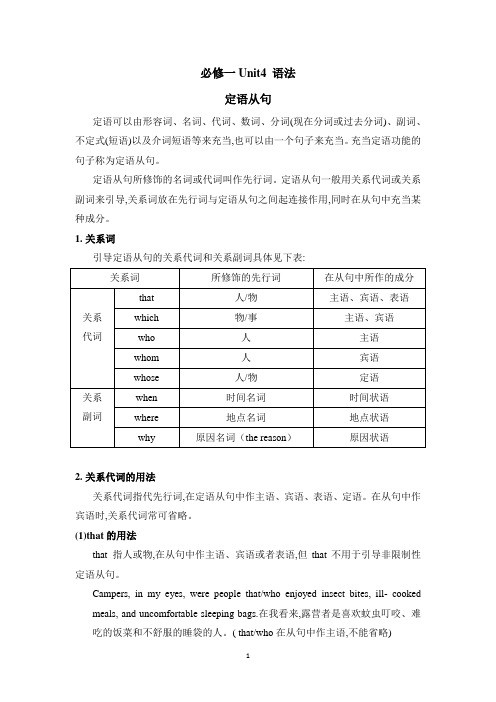
必修一Unit4 语法定语从句定语可以由形容词、名词、代词、数词、分词(现在分词或过去分词)、副词、不定式(短语)以及介词短语等来充当,也可以由一个句子来充当。
充当定语功能的句子称为定语从句。
定语从句所修饰的名词或代词叫作先行词。
定语从句一般用关系代词或关系副词来引导,关系词放在先行词与定语从句之间起连接作用,同时在从句中充当某种成分。
1.关系词引导定语从句的关系代词和关系副词具体见下表:2.关系代词的用法关系代词指代先行词,在定语从句中作主语、宾语、表语、定语。
在从句中作宾语时,关系代词常可省略。
(1)that的用法that 指人或物,在从句中作主语、宾语或者表语,但that不用于引导非限制性定语从句。
Campers, in my eyes, were people that/who enjoyed insect bites, ill- cooked meals, and uncomfortable sleeping bags.在我看来,露营者是喜欢蚊虫叮咬、难吃的饭菜和不舒服的睡袋的人。
( that/who在从句中作主语,不能省略)John is no longer the person ( that/who/whom) I knew five years ago.约翰不再是我五年前认识的那个约翰了。
(that/who/whom在从句中作宾语,可以省略) When the time came to make the final decision for a course , I decided to apply for the one that/which reflected my interest.到了最后决定修一门课程的时候,我决定申请那门能反映我兴趣的课程。
(that/which在从句中作主语,不能省略) The city is no longer the one ( that ) it used to be.这座城市不再是它原来的样子了。
高中英语人教版必修一第一单元语法非限制性定语从句PPT

必修第一册第一单元重点语法
定语从句的定义:
定语从句是由关系代词或关系副词引导的从句,其作用是作定语修饰主 句的某个名词成分,相当于形容词。 定语从句又分为限制性定语从句和非限制性定语从句。
限制性定语从句就是对某个名词(先行词)起约束作用,使该词含义 更具体。
如girl, a girl who is beautiful. 对girl这个词限定起来,而不是随便什么 girl。
A: which B: where C: in which D: what
句式分析,此句不缺少东西, 如果去掉从句,句意完整。
be famous for...
3: Last summer we visited the West Lake, __ Hangzhou is famous in the world.
He said that he had never seen her before, _______ was not true.
In the presence of so many people he was little tense, ______ was understandable.
which在非限制性定语从句中可指代和修饰的是主句中的名词,形容词,短语,其 他从句或整个主句,在从句中作主语,动词宾语,介词宾语或表语。
3: The boy, whose father is an engineer, studies very hard.
总结: 1:非限制性定语从句起补充说明的作用, 在句子中不充当成分,缺少也不会影响全 句的理解,它与主句之间通常用逗号隔开。
1:who John,__w_h_o_ sells ancient vases,is an old friend of my father’s. His sister,__w_h_o__ works in an antique shop,is coming to see him tomorrow.
高中英语必修一学案:定语从句
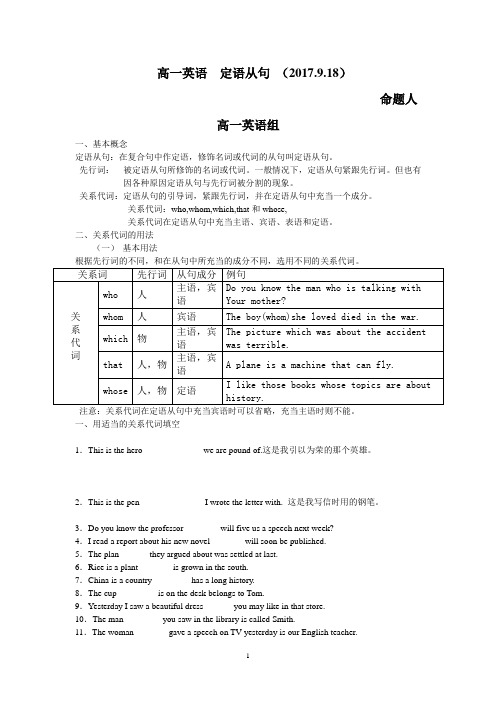
高一英语定语从句(2017.9.18)命题人高一英语组一、基本概念定语从句:在复合句中作定语,修饰名词或代词的从句叫定语从句。
先行词:被定语从句所修饰的名词或代词。
一般情况下,定语从句紧跟先行词。
但也有因各种原因定语从句与先行词被分割的现象。
关系代词:定语从句的引导词,紧跟先行词,并在定语从句中充当一个成分。
关系代词:who,whom,which,that和whose,关系代词在定语从句中充当主语、宾语、表语和定语。
二、关系代词的用法(一)基本用法根据先行词的不同,和在从句中所充当的成分不同,选用不同的关系代词。
注意:关系代词在定语从句中充当宾语时可以省略,充当主语时则不能。
一、用适当的关系代词填空__________1.This is the hero __________ we are pound of.这是我引以为荣的那个英雄。
______________________________2.This is the pen __________ I wrote the letter with. 这是我写信时用的钢笔。
__________3.Do you know the professor ________will five us a speech next week?4.I read a report about his new novel________will soon be published.5.The plan_______they argued about was settled at last.6.Rice is a plant________is grown in the south.7.China is a country_________has a long history.8.The cup _________is on the desk belongs to Tom.9.Yesterday I saw a beautiful dress_______you may like in that store.10.The man_________you saw in the library is called Smith.11.The woman________gave a speech on TV yesterday is our English teacher.12.This is the man________I mat in the park.二、改错1.Is this museum you visited a few days ago?2.The girl which is standing next to our teacher is her daughter.3.The cake you made it yesterday was very delicious.4.Do you know the man wrote the letter?5.The book you borrowed it from me is Tom’s.6.The house is built on soft land is easy to fall down.三、用定语从句合并下列句子1.This is the new secretary. I would introduce her to you.____________________________________________________________________________2.The train was late. It was going to Shanghai.____________________________________________________________________________ 3.The school is a big one. The school stands near the river._____________________________________________________________________________ 4.I will never forget the days. We spent the days together._____________________________________________________________________________ 5.My uncle bought the bike last week. The bike has been stolen._____________________________________________________________________________ 四、完成句子1.Wheat is a plant____________________________________.(中国北方种植的)2.This is the gentleman___________________________________.(眼睛失明的)3.He is not the man_________________________________.(原来的他)4.The girl ________________________________(正在会上发言的) is our monitor.5.Is this the book___________________________(你想要的)?6.He is the man____________________________(我正在找的人).7.The letter_________________________________(我昨天收到的)was from my aunt. (二)只用关系代词that的情况1.先行词是最高级形容词或它的前面有最高级形容词修饰时。
必修一Unit4 Grammar (1) 关系代词引导的定语从句
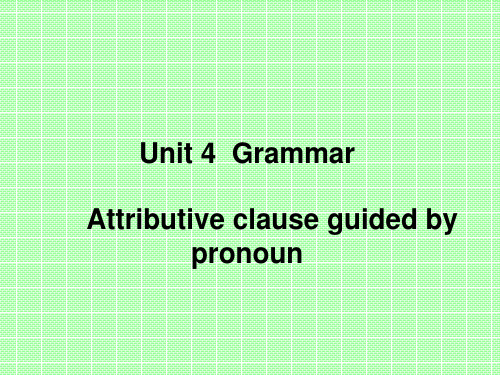
关系词通常有三个作用:①连接主从句;②指代 先行词;③在定语从句中充当一个句子成分。
定语从句分为限制性定语从句和非限制性定语从 句两类。
2.关系代词的基本用法
关系 代词
用法
例句
that
既可指人也可指 物,在定语从句 中作主语、宾语 或表语,作宾语
时常可省略。
①This is the factory that produces cars. (作主语,指物) ②The girl that spoke to me just now is my classmate. (作主语,指人) ③The film (that) we saw yesterday is interesting. (作宾语,指物)
①Here is the man (whom) you are looking for.
②The woman (whom) you saw just now is our English teacher.
whose
可指人,也可指物,在定语
从句中作定语。指人时,相 当于of whom;指物时,相
当于of which。
Unit 4 Grammar
Attributive clause guided by pronoun
定语从句(Ⅰ) 1.概念 (1)定语从句:在复合句中作定语修饰主句中某一名 词或代词的从句叫定语从句。
(2)先行词:被定语从句修饰的词,叫做先行词。
(3)关系词:引导定语从句的词叫做关系词。关系词 分为关系代词(that,which,who,whom,whose, as等)和关系副词(when,where,why等)两类。
(4)当先行词本身是that时。
The clock is that which tells the time.
外研版新版必修一UnitFour(Friendsforever)语法讲解
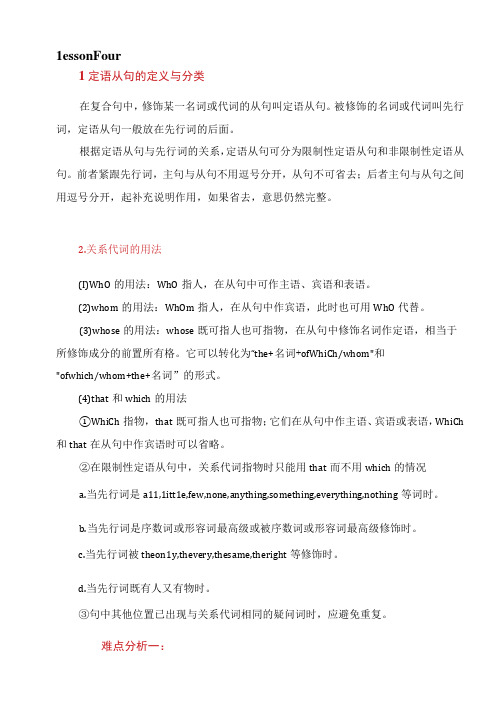
1essonFour1定语从句的定义与分类在复合句中,修饰某一名词或代词的从句叫定语从句。
被修饰的名词或代词叫先行词,定语从句一般放在先行词的后面。
根据定语从句与先行词的关系,定语从句可分为限制性定语从句和非限制性定语从句。
前者紧跟先行词,主句与从句不用逗号分开,从句不可省去;后者主句与从句之间用逗号分开,起补充说明作用,如果省去,意思仍然完整。
2.关系代词的用法(I)WhO的用法:WhO指人,在从句中可作主语、宾语和表语。
(2)whom的用法:WhOm指人,在从句中作宾语,此时也可用WhO代替。
(3)whose的用法:whose既可指人也可指物,在从句中修饰名词作定语,相当于所修饰成分的前置所有格。
它可以转化为“the+名词+ofWhiCh/whom"和"ofwhich/whom+the+名词”的形式。
(4)that和which的用法①WhiCh指物,that既可指人也可指物;它们在从句中作主语、宾语或表语,WhiCh 和that在从句中作宾语时可以省略。
②在限制性定语从句中,关系代词指物时只能用that而不用which的情况a.当先行词是a11,1itt1e,few,none,anything,something,everything,nothing等词时。
b.当先行词是序数词或形容词最高级或被序数词或形容词最高级修饰时。
c.当先行词被theon1y,thevery,thesame,theright等修饰时。
d.当先行词既有人又有物时。
③句中其他位置已出现与关系代词相同的疑问词时,应避免重复。
难点分析一:(I)Whatif用于提出假设时,意思是“倘若……,假若……怎么办,要是……将会怎么样”,其后句子可用陈述语气(一般现在时),也可用虚拟语气(一般过去时或ShOUk1+动词原形;若是针对过去情况,从句则用过去完成时)。
(2)Whatif表示邀请或建议时,意思是“……怎么样?如果……如何?”。
最新必修一限制性定语从句与非限制性定语从句
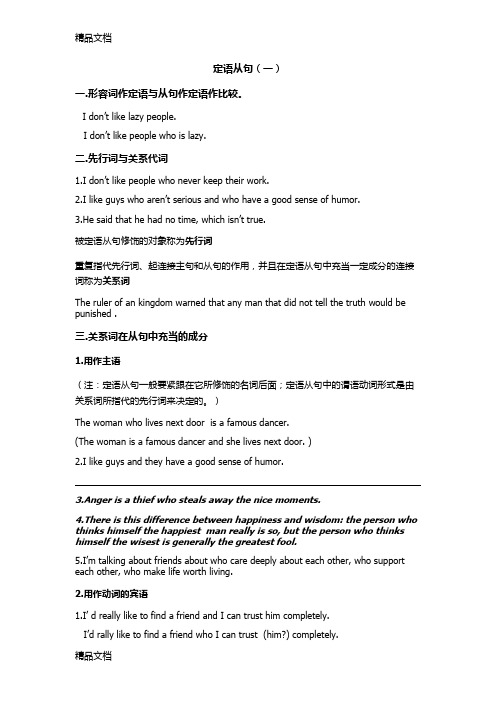
定语从句(一)一.形容词作定语与从句作定语作比较。
I don’t like lazy people.I don’t like people who is lazy.二.先行词与关系代词1.I don’t like people who never keep their work.2.I like guys who aren’t serious and who have a good sense of humor.3.He said that he had no time, which isn’t true.被定语从句修饰的对象称为先行词重复指代先行词、起连接主句和从句的作用,并且在定语从句中充当一定成分的连接词称为关系词The ruler of an kingdom warned that any man that did not tell the truth would be punished .三.关系词在从句中充当的成分1.用作主语(注:定语从句一般要紧跟在它所修饰的名词后面;定语从句中的谓语动词形式是由关系词所指代的先行词来决定的。
)The woman who lives next door is a famous dancer.(The woman is a famous dancer and she lives next door. )2.I like guys and they have a good sense of humor.3.Anger is a thief who steals away the nice moments.4.There is this difference between happiness and wisdom: the person who thinks himself the happiest man really is so, but the person who thinks himself the wisest is generally the greatest fool.5.I’m talking about friends about who care deeply about each other, who support each other, who make life worth living.2.用作动词的宾语1.I’ d really like to find a friend and I can trust him completely.I’d rally like to find a friend who I can trust (him?) completely.2.It’s hard to have a friend and you can trust him completely.3.He is the best teacher who I have never seen.4.He is the student who teacher likes to praise for his hard work.3.作从句中介词的宾语1.I’m talking about friends and you can share almost everything with them.I’m talking about friends who you can share almost everything (with them).2.I hope I never have a boss and I can talk to him about my problems.3.I’d prefer someone who I have sth. in common with--- who I can talk ( ) easily.4.I like the people who I work ( ).(作宾语的关系词可以省去)三.关系代词与先行词的搭配关系(一).关系代词:who, whom which, that 和whose1.指“人”关系代词 who 和whom 的区别(1)who 的前面不能与介词搭配使用The engineer with (who; whom) my father works is about 50 years old.(2 ) whom 在定语从句不能做主语,但可作宾语或表语。
高必修一 U4 语法讲解:定语从句(关系代词)
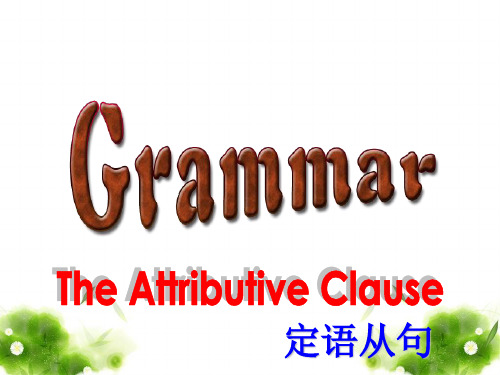
2. I have seen some strange trees, _____ B open at sunrise and close at sunset. A. which the leaves B. whose leaves C. which leaves D. their leaves 3. All _____ we need is enough rest after B long hours’ work. A. the thing B. that C.ootball, _______ is a very interesting game, is popular all over the world. which 2. This is the house in _______ he once lived. 结论4: 只能用which,不能用that的情况: 1. 引导非限制性定语从句时。 2. 介词提前时。
结论1: 先行词还原代入后在从句中充当主语: 指人:who / that 指物: which / that 充当宾语: 指人who(m) / that 指物 which / that 充当定语: whose 或 of which / of whom 充当表语:指人 / 物 that 注:当先行词在从句中充当宾语时,关系代词可
1. 看定语从句中动词与介词的搭配
He is the man ___ whom you can believe. in
2. 看定语从句中形容词与介词的搭配
He gave me some books _____ which I am with not very familiar.
3. 根据先行词判断,所用的介词与先行词搭配
二、定语从句 当定语是由一个句子充当时,这个句子称为定 语从句;其修饰或限定的名词或代词称为先 行词。 定语从句的结构不完整,其缺少的成分由其引 导词--关系代词或关系副词充当;同时,关 系词还用于指代先行词。 This is the car which he bought last year. 先行词 关系代词 定语从句
高一英语必修一定语从句总结
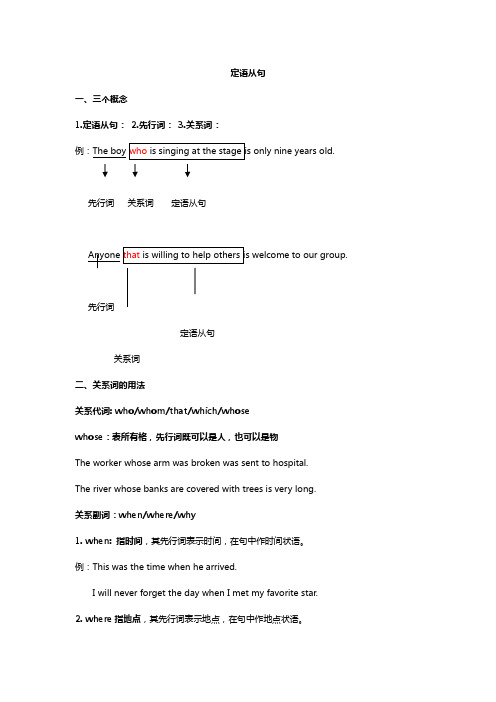
定语从句一、三个概念1.定语从句:2.先行词:3.关系词:例:The boy who is singing at the stage is only nine years old.先行词关系词定语从句Anyone that is willing to help others is welcome to our group.先行词定语从句关系词二、关系词的用法关系代词: who/whom/that/which/whosewhose:表所有格,先行词既可以是人,也可以是物The worker whose arm was broken was sent to hospital.The river whose banks are covered with trees is very long.关系副词:when/where/why1. when: 指时间,其先行词表示时间,在句中作时间状语。
例:This was the time when he arrived.I will never forget the day when I met my favorite star.2. where指地点,其先行词表示地点,在句中作地点状语。
例:This is the factory where he works.Nanjing is the place where I was born.3. why 指原因,其先行词是原因,起原因状语作用。
例:Nobody knows the reason why he is often late for school.Is this the reason why he refused our offer?注意:关系副词when, where, why, 的含义相当于“介词+which”结构,因此常常和“介词+which“结构交替使用。
例:I will never forget the day on which I met my favorite star.【when】Nanjing is the place in which I was born.【where】Is this the reason for whic h he refused our offer?【why】四、关系代词that的特殊用法只用that 的情况1.先行词被序数词或形容词最高级所修饰,或本身是序数词、基数词、形容词最高级时,只能用that,而不用which.例如:He was the first person that passed the exam.2.被修饰的先行词为all, any, much, many, everything, anything, none, the one等不定代词时,只能用that,而不用which.例如:Is there anything that you want to buy in the shop?3.先行词被the only, the very, the same, the last, little, few 等词修饰时,只能用that,而不用which.例如:This is the same bike that I lost.4.先行词里同时含有人或物时,只能用that,而不用which.例如:I can remember well the persons and some pictures that I saw in the room.5..以who或which引导的特殊疑问句,为避免重复,只能用that.例如:Who is the girl that is crying?6.主句是there be 结构,修饰主语的定语从句用that,而不用which.例如:There is a book on the desk that belongs to Tom.7.先行词在主句和从句中都作表语时,只能用that.例如:He is not the man that he once was.8.先行词是the way时,只用that不用that 的情况1.先行词为that, those时,用which,而不用that.例如:What’s that which is under the desk?2.关系代词前有介词时,一般用which,而不用that.例如:This is the room in which he lives. 这是他居住的房间。
人教版高中英语必修一Book1Unit4Grammar(定语从句(一))
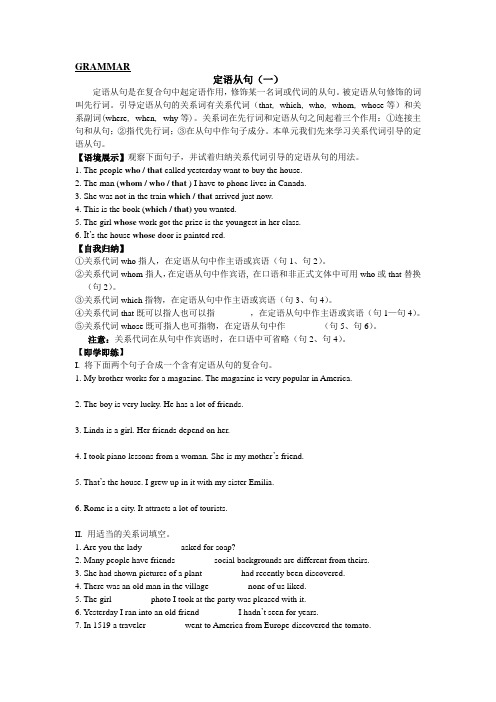
GRAMMAR定语从句(一)定语从句是在复合句中起定语作用,修饰某一名词或代词的从句。
被定语从句修饰的词叫先行词。
引导定语从句的关系词有关系代词(that, which, who, whom, whose等)和关系副词(where, when, why等)。
关系词在先行词和定语从句之间起着三个作用:①连接主句和从句;②指代先行词;③在从句中作句子成分。
本单元我们先来学习关系代词引导的定语从句。
【语境展示】观察下面句子,并试着归纳关系代词引导的定语从句的用法。
1. The people who / that called yesterday want to buy the house.2. The man (whom / who / that ) I have to phone lives in Canada.3. She was not in the train which / that arrived just now.4. This is the book (which / that) you wanted.5. The girl whose work got the prize is the youngest in her class.6. It’s the house whose door is painted red.【自我归纳】①关系代词who指人,在定语从句中作主语或宾语(句1、句2)。
②关系代词whom指人,在定语从句中作宾语, 在口语和非正式文体中可用who或that替换(句2)。
③关系代词which指物,在定语从句中作主语或宾语(句3、句4)。
④关系代词that既可以指人也可以指________,在定语从句中作主语或宾语(句1—句4)。
⑤关系代词whose既可指人也可指物,在定语从句中作________(句5、句6)。
注意:关系代词在从句中作宾语时,在口语中可省略(句2、句4)。
- 1、下载文档前请自行甄别文档内容的完整性,平台不提供额外的编辑、内容补充、找答案等附加服务。
- 2、"仅部分预览"的文档,不可在线预览部分如存在完整性等问题,可反馈申请退款(可完整预览的文档不适用该条件!)。
- 3、如文档侵犯您的权益,请联系客服反馈,我们会尽快为您处理(人工客服工作时间:9:00-18:30)。
定语从句定语:用来描述名词或代词的修饰语。
She is a lovely girl.We love our country.This is a stone desk.定语的位置:This is a flower basket.This is a basket full of flowers.This is a basket that I want to put flowers in.定语从句:在复合句中,用来修饰名词或代词的从句。
定语从句所修饰的词叫先行词。
She is the girl who can speak English well.先行词关系词关系词作用:1引导定语从句2代替先行词3充当成分从句主宾表成分残缺-----选择which,that(先行词是物)who,whom,that(先行词是人)从句成分不残缺(意思表达完整)-----选择whose(…的),when(作时间状语),where(作地点状语),why(the reason)This is the doctor ______ saved my life.Do you know the man _______ we saw yesterday?China is a country ________ has a long history.The man ________ makes some good films is Zhang Yimou.That is the new machine _______ parts are too small to see.I like the person ______________you just talked.☆只能用that不用which的情况(1) 先行词为all, everything, nothing, something,anything, little, much 等不定代词时。
Do you have anything _____ you don’t understan d?(2)先行词被all, every, no, some, any, little, much等修饰时。
Please send us any information _____ you have about the subject.(3)先行词被序数词或最高级修饰时。
It is the most beautiful city _____ I’ve ever seen.(4)先行词被the only, the very, the same, the last修饰时。
He is the only person _____ was present at the time.(5)先行词既有人又有物时。
The famous writer and his works _____ the radio broadcast are popular to the students.(6) 先行词是who或which引导的主句。
Who is the girl _____ drove the car?(7) 主句以there be 引导时。
There are more than 400,000 people _____ died or were injured in the earthquake.☆只用which不用that的情况(1) 关系代词在限制性定语从句中紧跟介词作宾语(介词提前)。
There are many trees __________ they can have a rest.This is the ring __________ she spent 1000 dollars.(2) 在非限制性定语从句中。
Football, ______ is a very popular game, is played all over the world.☆只用who的情况先行词是one, ones, anyone, those时用who.Those ____ want to go to The Great Wall sigh up here.☆表所有关系及整体中的一部分或全部时,用介词of, 有时可用whose转换。
The classroom whose door (the door of which) is broken will soon be repaired.I’m painting a house __________ roof is round.I’m painting a house, the roof _________ _________is round.练习1. All ______ is useful to us is good.A.whichB.whatC.thatD.whether2. She will never forget the days ______ she spent in Beijing.A.whenB.whatC.whichD.why3. The man ______ you are talking about is in the next room.A. to whomB. whomC. whoD. which4. The text is one of the most interesting stories ______ learned in the past three years.A.that haveB. that have beenC.which hasD. which has been5. The college won’t take on anyone ______ eyesight is weak.A.whoB.whoseC.of whomD.which6. Here is the bicycle ______ in the shop.A.that you saw itB.that saw itC.you sawD.you saw it7. Those ______ to take part in the game write down your names, please.A.whoB.who wantC.that wants D want8. I, _____ your good friend, will try my best to help you out.A.who isB.what isC.what amD.who amwhere (地点状语)★关系副词when (时间状语)why (原因状语)★如何判定用关系代词还是用关系副词I will never forget the days (______ I stayed with you).Do you remember the lake _____ (you first met your girlfriend.)Please give me the reason _____ (you made such a great success).1The house ______ (they built in 1987) stayed up in the earthquake.Luckily none of the people _____ ( I know) were killed in the earthquake.(1)This is the factory ________ I visited last year.(2)This is the factory _______ I worked last year.(3)This is the factory _______ produces all kinds of TV sets.A. whereB. whichC. whomD. whose关系副词when =介词+whichThey’ll never forget July 1 _____ Hong Kong returned to its motherland.比较Do you still remember the day ___________ we spent happily together?Do you still remember the day ______we spent our holiday happily together?Do you still remember the day______ we went to visit the Summer Palace?(4)I will never forget the day _______ we spent together.(5)I will never forget the day ___we worked together.A. whichB. whenC. whereD. what找准定语从句的先行词。
定语从句必须有先行词,否则就不是定语从句。
误:Is this farm we visited last week?该句中定语从句就缺少先行词,将句子还原为陈述句:This farm is ________ we visited last week.显然应加上the one作先行词。
正:Is this farm the one we visited last week?当然,这句话改为下面这种形式也是正确的:Is this the farm we visited last week?(6)Is this library ________ you often read in?(7)Is this the library _______ you often read in?A. the oneB. in whichC. whereD. which(8)This is the reason ________ he was absent.(9)This is the reason _______ can explain his absence.A. whichB. whyC. whenD. in which当先行词为situation, case, stage, point,process,condition,position等,且关系词在定语从句中作状语,也要用关系副词where。
1).They have reached the point where they have to separate with each other.2).I can think of many cases _______ students obviously knew a lot of English words and expressions but couldn’t write a go od essay.A. whyB. whichC. asD. where★介词+关系代词如何选定介词:1.根据从句中动词与先行词的逻辑关系,请体会:e.g. Is that the newspaper for which you often write articles?2. 根据从句中动词或形容词的习惯搭配,如:e.g. Can you explain to me how to use these idioms about which I’m sure.3. 根据先行词与介词的搭配习惯,请体会:e.g. 1949 was the year in which the P.R.C. was founded.4. Whose从句可转换为“ of +关系代词”型,如:e.g. They live in a house, whose door opens to the south.→They lived in a house, of which the door opens to the south.→ They lived in a house, the door of which open to the south.关系副词when, where, why可以用适当的介词+which来替代。
